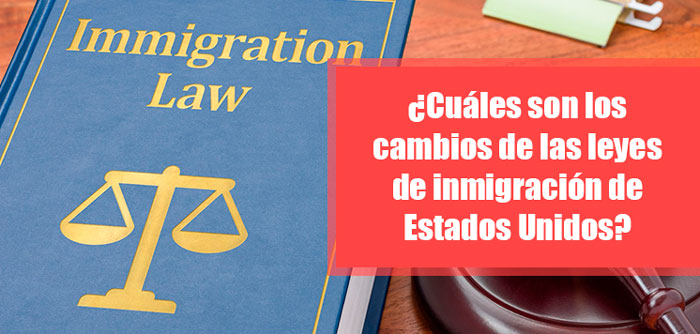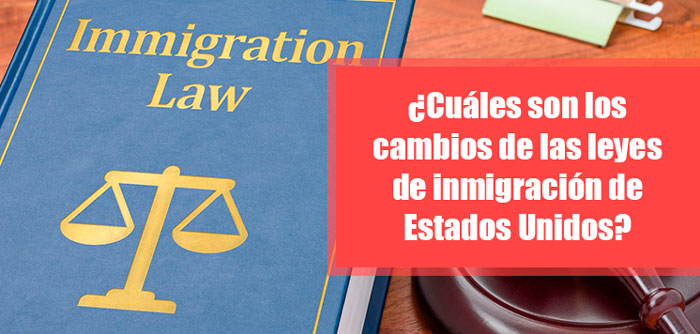You need to know about the united states immigration laws whether you have entered the country as an illegal immigrant or, on the contrary, if you have presented all the documentation to become a legal permanent resident, because all people who entered the United States need to know the new laws that affect both the legal and the illegals.
What are the changes to the immigration laws of the United States
The main objective of the new united states immigration laws it is the reduction of illegal immigration.
For this, changes were made in the USCIS Citizenship and Immigration Services of the United States) with respect to immigrants who at one time entered the United States legally to know if they deserve to be deported or not.
USCIS developed rules and protocols that affect legal immigrants at both the punitive and benefit levels, since permanent residency is one of the benefits that a legal immigrant can acquire.
In fact, immigration benefits reach all people who abide by the law and entered the United States with the purpose of finding new opportunities for a prosperous and secure future.

What are the latest immigration laws in the United States
The latest immigration laws in the United States have to do with changes that relate to notices or subpoenas to appear in the NTA or Notice to Appear:
- When an immigrant receives a notice or summons to appear before the immigration court, they may suspect that the exclusion process is initiated, which is commonly known as deportation.
- According to USCIS, these types of notifications are issued in different situations such as when an immigrant requests an immigration benefit and it is denied, when an immigrant has committed a criminal activity or when there is evidence of fraud.
- According to the protocol, immigration officials now have more powers with guides to reinforce priorities in the sense that the laws established by the president are complied with.
- This is expected to make the community safer while protecting the immigration system.
- USCIS also states that its officials can more easily act by reporting cases to immigration police or submitting dated notices to attend before a judge.
- Those who applied for or received DACA, the deferred action for childhood arrivals, are exempt from this rule.
How are the new immigration laws 2018
- The new immigration laws 2018 They cover or affect many people who entered the United States, since it does not matter if you have a permanent residence permit and therefore you have your Green card or your US passport with you.
- If you are a legal immigrant who used the United States social services, such as the emergency service for people with low resources or Medicaid health insurance and you are looking for your citizenship and accessing your green card, from now on the procedures will be a lot more cumbersome, since the intention is to present difficulty in accessing the Green card and therefore citizenship.
- If you apply for the green card and make a mistake regardless of its severity, it may be that you made a mistake by entering only one wrong letter, In this situation you will receive a notification to appear before the immigration judge.
- When you receive the notification to appear before the immigration judge, the deportation process begins, even if you have not committed any offense or if you have lived in the United States for many years.
- When you request your Green card you must make a deposit of 10 thousand dollars as a proof of your financial solvency.
- If a USCIS officer rejects your application, you will receive a summons or notice with the date for you to appear before an immigration judge and it will be the first step you have taken to start the deportation process.
- If you forgot to attach a document or made a mistake, that mistake cannot be rectified or returned to present the missing document.
What do the new immigration laws say for residents 2018?
Although as a legal resident you know that entering and leaving the country was your right and therefore you did not require a special permit because you have the legal documents like any American citizen, with the new immigration laws for residents 2018 everything has changed:
- If you leave the United States and are absent from the country for more than a year, it is considered that you abandoned your status and through the United States government they will invite you to renounce your residence.
- If, as a legal resident, you are absent for 6 months, your green card is in danger because when the federal agent receives you, he may assume that your residence is not the United States but that of the foreign country.
- If you are absent for more than a year, the customs officer will consider that you abandoned your status, unless you justify your absence and also have a permit to return to the United States.
- If you are absent for more than 6 months and the agent realizes it, they have the right to cancel your residence.
- If you sign the new form I-407 automatically, you are abandoning your permanent residence.
- If you accept a public benefit including tax deductions, you can see your legal residence private.
- In fact, if you receive welfare payments, it is considered a public position and as an immigrant the rules penalize you.
- If you are an immigrant who is protected by DACA, the new immigration law affects you when you apply for full legal residency.
- If you are an immigrant, you can be expelled from the country if you suffered a conviction for a criminal offense, if you were charged with a crime that has not yet been resolved, if you committed an act that constitutes a punishable criminal offense, if you deliberately engaged in fraud or misrepresentation before an official or when you submit your application to a government agency, if you received the deportation order and did not leave and if you are considered an immigrant at risk for public or national security.

